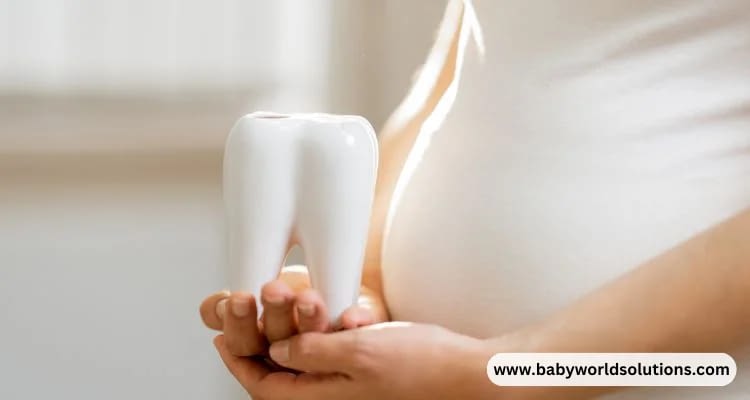Pregnancy is a crucial period for women, with several body changes. From morning sickness to mood swings, the hormonal changes experienced during pregnancy affect every aspect of a woman’s life. While most women prepare for the physical changes expected during pregnancy, it’s easy to overlook changes that affect oral health.
During pregnancy, tooth sensitivity is a prevalent oral health concern many individuals experience. Although it is usually not a severe condition, tooth sensitivity can cause discomfort and impact your overall well-being.
This blog post provides insights into the potential causes behind when does teeth sensitivity start in pregnancy and practical tips for managing tooth sensitivity throughout the pregnancy journey.
Causes: When does teeth sensitivity start in pregnancy?
Teeth sensitivity during pregnancy is a common occurrence and can start anytime during the pregnancy period. Some pregnant women experience teeth sensitivity in their first trimester, while others do not experience it until the third trimester. However, the second trimester is the most common timeframe for teeth sensitivity during pregnancy.
Common Causes of teeth sensitivity early pregnancy
Several factors contribute to teeth sensitivity during pregnancy or sensitive teeth after pregnancy:
- Hormonal changes: The hormones present during pregnancy can cause the body to produce more saliva, weakening the enamel on your teeth and increasing sensitivity.
- Morning sickness: Vomiting caused by morning sickness can erode tooth enamel and cause an increase in tooth sensitivity.
- Poor oral hygiene: Another cause of teeth sensitivity during pregnancy is poor dental hygiene.
- Acidic foods and drinks: Consuming acidic foods and beverages such as citrus, soft drinks, or energy drinks can also contribute to tooth sensitivity.
- Dental procedures: Certain procedures performed during pregnancy, such as fillings, can cause teeth sensitivity.
- Gum disease: Pregnancy hormones can increase gum disease risk, leading to tooth sensitivity.
- Grinding your teeth: Stress caused by pregnancy can cause some women to grind their teeth while sleeping, resulting in increased sensitivity.
- Tooth decay: Poor oral hygiene habits coupled with a higher sugar intake due to cravings may result in tooth decay and increased sensitivity in pregnant women.
- Direct trauma: Injury or trauma to the mouth caused by accident or sports can cause teeth sensitivity.
- Pregnancy-related medications: Certain medications, such as antibiotics, can increase tooth sensitivity.
- Too much brushing: Brushing your teeth too vigorously or using a hard bristled brush can wear away the enamel on your teeth and increase sensitivity.

Tips for managing teeth sensitivity during pregnancy
If you’re experiencing teeth sensitivity during your pregnancy or postpartum teeth sensitivity, there are several things you can do to manage and prevent the discomfort.
Good oral hygiene
It is easy to control teeth sensitivity when you maintain good oral hygiene. Fluoride toothpaste and brushing twice daily can keep teeth and gums healthy and help reduce teeth sensitivity.
Watch what you eat
Another way to manage teeth sensitivity during pregnancy is to watch what you eat. Avoid sugary and acidic foods, limit your carbonated beverages and caffeine intake, and increase your calcium- and vitamin D-rich foods like dairy products, leafy greens, and fish.
Schedule regular dental checkups.
To maintain good oral health while pregnant, it is crucial to schedule regular dental examinations. Dental cleanings and checkups significantly prevent tooth sensitivity, gum disease, and tooth decay.
By following these recommendations, you can effectively preserve the strength and health of your teeth throughout your pregnancy. Appropriate care can help you manage any tooth sensitivity you may experience.

Is Sensitive teeth early pregnancy symptom?
During pregnancy, sensitive teeth can be an early indication in certain situations. The hormonal changes related to pregnancy can heighten the sensitivity and tenderness of your gums, leading to amplified discomfort when you consume hot or cold food items and bite down on them.
It is crucial to schedule a dental visit if you notice increased tooth sensitivity during pregnancy to eliminate any underlying cause. You should also inform your dentist of your pregnancy to allow them to make the appropriate changes to your treatment.
If not, then what are the other early pregnancy symptoms?
Other common early pregnancy symptoms include:
- Fatigue
- Morning sickness
- Food cravings
- Breast tenderness
- frequent urination
- Mood swings.
Symptoms like backaches, headaches, stretch marks, and constipation may also occur as the pregnancy progresses. Additionally, women may experience more vivid dreams due to the changing hormones during pregnancy.
Keeping track of any physical and emotional changes you experience during your pregnancy is essential since they can be a sign that something is wrong and should be addressed with a medical professional.
If you encounter any of these initial symptoms, it is crucial to promptly consult your doctor to receive the essential care required for a healthy pregnancy.
Can you use mouthwash while pregnant?
Generally, the utilization of mouthwash during pregnancy is considered safe. However, some mouthwashes contain alcohol which could pose a risk for pregnant women, so avoid these products if possible. For the best results, look for a gentle, alcohol-free mouthwash to help maintain oral hygiene during pregnancy.
Additionally, try brushing your teeth with fluoride toothpaste twice daily and flossing regularly to help reduce the risk of plaque buildup and gum disease.
Maintaining regular dental checkups while pregnant is essential, as many pregnant women are more prone to developing gum disease. Your dentist can provide additional guidance about what steps to take to maintain good oral hygiene while pregnant.
Finally, limiting the intake of sugary beverages is crucial, as excessive consumption can contribute to the formation of plaque and cavities. Maintaining a balanced diet that includes ample fresh fruits and vegetables is beneficial for promoting dental health during pregnancy.
What dental changes occur during pregnancy?
Pregnancy can bring about changes in the teeth and gums. Hormonal shifts, increased levels of progesterone and estrogen, or higher acidity in the mouth typically cause these changes. Some common dental changes during pregnancy include:
- Increased sensitivity of the teeth
- Pregnancy Gingivitis
- Enamel erosion or discoloration of the teeth due to higher acidity in the mouth
- Hyperdontia – an increase in the number of teeth, which can lead to overcrowding and misalignment
- Increased risk for cavities as a result of sugary cravings and decreased oral hygiene
- Pregnancy Tumors – harmless growths that form on the gums due to an increase in hormones
Pregnant women should also inform their dentists about any changes in their dental health or problems they may be experiencing during pregnancy. It will help ensure that any issues can be addressed quickly and effectively, allowing the patient to maintain a healthy mouth and smile throughout her pregnancy.

Are you having tooth pain when drinking room temperature water?
This is a common issue that several different factors can cause. The most likely cause of this discomfort is exposed dentin, the soft inner layer of the tooth typically covered by enamel.
When enamel deteriorates or wears away due to improper dental hygiene, acids from food and beverages (such as water) can reach the dentin and cause painful sensations.
Other causes of tooth pain when drinking room temperature water can include cavities, cracked teeth, gum disease, or a sinus infection.
It is important to schedule an urgent appointment with your dental office if you experience such pain. The dentist will identify the cause of the pain, early pregnancy teeth sensitivity and make appropriate recommendations.
Depending on the cause, your dentist may suggest filling a cavity, covering exposed dentin with a crown or filling, or treating gum disease. Your dentist may refer you to an ENT specialist for further evaluation and treatment for sinus infections.
Are teeth suddenly sensitive to sugar?
If your teeth suddenly become sensitive to sugar, it may be caused by underlying issues such as tooth decay, gum recession, enamel erosion, or other dental problems.
To alleviate sensitivity and prevent additional harm, it is essential to consult your dentist, who can diagnose and provide treatment for the issue. Alongside dental visits, taking proactive measures to enhance your oral health is important. These may involve refraining from consuming sugary foods and beverages, brushing, regular flossing, using an antibacterial mouthwash, and maintaining a well-balanced diet.
Occasionally, tooth sensitivity might arise from a dental condition that self-care cannot resolve. In such cases, your dentist may propose alternative options like fillings, crowns, root canals, or gum grafting as further treatment measures. Proper care and preventive measures allow you to protect your teeth and enjoy sweet treats without discomfort.
Conclusion:
Tooth sensitivity during pregnancy is common, but it’s usually nothing to worry about. The hormonal changes and poor dental hygiene associated with pregnancy can cause teeth sensitivity, but you can take several simple steps to manage the discomfort.
Maintaining good oral hygiene, watching what you eat, and scheduling regular dental checkups are all effective ways to keep tooth sensitivity at bay while you enjoy this particular period.
1 Visit today





